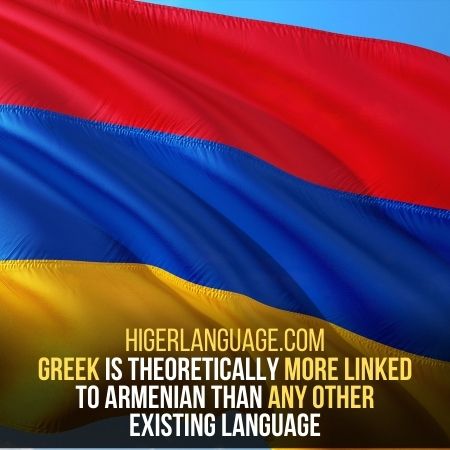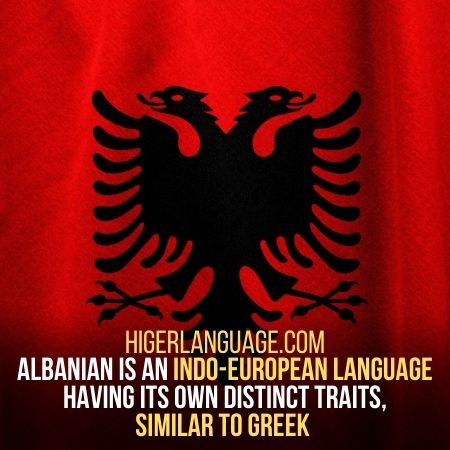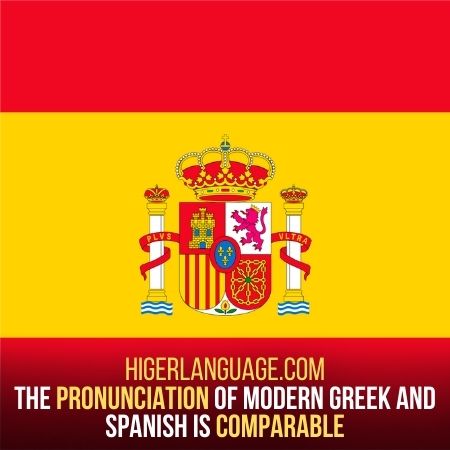Greek is the only member of its branch on the tree of the Indo-European language family.
But, it has some similarities with the languages of other branches.
So, “What are the languages similar to Greek?”
This article explains the similarities between some languages and Greek. Read to explore these parallels.
Languages Similar To Greek – A List Of 7 Languages
Greek is most similar to Albanian, Armenian, and English.
Below is a list of 7 languages similar to Greek.
1. Armenian – Most Similar Among The Languages Similar To Greek:
Linguists suggested a hypothesis in the twentieth century.
According to that, the Greek and Armenian languages had a common ancestry.
As a result, a Graeco-Armenian language has been proposed. It predates the Proto-Indo-European language.
Greek is theoretically more linked to Armenian than any other existing language.
Both languages, however, are Indo-European, European, and inflected.
Both languages have a lot of regional terminology in common.

The hypothesized common predecessor of Armenian and Greek is Graeco-Armenian (or Helleno-Armenian).
Within the Indo-European family, Greek and Armenian have a specific affinity.
Although the basic vocabulary is the same, each group’s word choice differs.
2. Albanian – One Of The Languages Similar To Greek:
Albanian is from the Indo-European family of languages.
However, it has distinct traits that are similar to those of Greek or Armenian.
This means it has no direct kinship with other members of the same family of languages.
Albania also has a number of loans from its neighbors.
However, it still bears little resemblance to the Ancient Greeks.
The Gheg mokn (Tosk mokr) ‘millstone,’ derived from the Greek “mkhan,” is one example.
The verb system has a lot of ancient elements.
For example, the retention of distinct active and passive personal ends, such as in Greek.

Albanian syntax and formal differences are reminiscent of Romance languages and Modern Greek.
Although the sounds are similar to Greek or Hungarian, Gheg is known for its nasal vowels.
3. Spanish Lies Among The Languages Similar To Greek:
The pronunciation of Modern Greek and Spanish is comparable. Their lexical mutuality is fair.
The linguistic similarity between Spanish and Greek results from any linguistic similarity between Latin and Greek.
Yes, phonologically, they are pretty close.
Greek and Spanish followed several similar paths, resulting in similar outcomes.
Given the diversity of the IE language family, this isn’t particularly noteworthy.
Between vowels in Spanish and Greek, there is a fricative realization.
They have occlusive realization at the start of the word and following a nasal.

A sibilant has only one articulatory position in both languages.
So, it has a rather large articulatory space because there is no contrast in this area.
The vowels /a, I e, u, o/ are the same in both languages.
However, this is perhaps the most prevalent vowel set among the world’s languages.
4. Sanskrit:
Sanskrit, an ancient Indo-European language of the Indian subcontinent, also bears similarities to Greek.
Like Greek, Sanskrit is an inflected language with a rich morphological system.
It includes noun declensions, verb conjugations, and extensive use of participles.
Both languages also have complex phonology and morphology systems, with various vowel and consonant sounds.
Furthermore, Sanskrit and Greek share cognates and lexical similarities.
It reflects their common ancestry within the broader Indo-European language family.
5. Coptic:
Coptic emerged as a result of Egypt’s encounters with various foreign powers.
It includes the Greeks under the Ptolemaic dynasty and the Romans during the Roman period.
This historical backdrop laid the foundation for the extensive influence of Greek on the Egyptian language.
This leads to the development of Coptic.
Egypt underwent significant cultural and linguistic transformations during the Hellenistic and Roman eras.
It is with Greek becoming the administrative and cultural language of the ruling elite.
Consequently, the Coptic absorbed many Greek loanwords, particularly in government, religion, trade, and daily life.
Linguistically, Coptic shares striking similarities with Greek, which is evident in several aspects of its structure and lexicon.
Notably, the vocabulary of Coptic is enriched with numerous loanwords borrowed directly from Greek.
These loanwords span diverse semantic fields, ranging from religious and philosophical terminology to scientific and technological concepts.
6. English Language:
The Greek language has influenced the English language significantly. Let’s look at it more closely.
Greek is one of the oldest Indo-European languages.
Ancient and modern Greek are the most common divisions.
Modern Greek belongs to Koine, an ancient Greek dialect.
It was spoken throughout the Greek-speaking globe at the time.
The Greeks were the first to employ a ‘true’ alphabet with vowels and consonants.
Similarities Between Greek And English:
The Oxford Guide to the English Language mentions classical Greek’s influence on English.
It was mostly indirect, via French and Latin, and lexical and intellectual.
More than 150,000 English terms are usually thought to come from Greek words, as per the estimate.
Technical and scientific terms are among these words.
The words starting with “ph-” all belong to Greek origin. For example, Philosophy, photo, physical, and phrase.

Many English words consist of morphemes (word components.) They also come from the Greek language. For example:
– Phobia (fear of), used in arachnophobia – fear of the spiders
– Micro (tiny/small), used in microscopic – hard to see (so small)
– Demos (people) used in democracy – people’s government
7. Latin – Is It From The Languages Similar To Greek:
The link to the Indo-European family is the most striking similarity between these two languages.
Both Greek and Latin are from separate branches of the Indo-European language family.
Still, they share some commonalities.
Greek and Latin languages aren’t especially connected when comparing the two alphabets.
On the other hand, the scripts employed to write the languages are closely linked.
In Latin, the perfect tenses and aorist have been combined into one.
But, in Ancient Greek, both tenses were present separately.
However, the remainder of the tempora is identical. This seems to be a significant distinction from Germanic languages.

There are parallels in the case system as well.
The old Latin genitive declension is like the genitive of the Greek a-declension (-as/-es). It still exists in the well-known pater familias.
Ancient Greek Vs. Modern Greek
Here are some basic differences between Ancient Greek and Modern Greek.
| Ancient Greek | Modern Greek |
| Ancient Greek is a branch of the Greek language and an Indo-European language. | Modern Greek is a modernized form of Ancient Greek and other similar languages. |
| It was created sometime between the 19th and 16th centuries BC. | It dates back to 1453 AD. |
| Usually found in ancient philosophies, plays, and other works. | Not just Greeks but also individuals from other cultures use it frequently. |
| It is not used in its actual form anywhere. | In the name of Greek, numerous nations speak this language. |
| Only capital letters were used in ancient Greece. | It also features small lettering. |
| Short and long vowels are present. | Only short vowels are in use. |
| Indicative, Subjunctive, Imperative, and Optative were the four verb moods. | Auxiliary verbs, Modal verbs, gerunds, and participles were all present. |
| As an ancient language, it’s useful. | Because it is commonly spoken and written, it is useful. |
Conclusion:
Greek is the primary language of Greece and Cyprus. Gjirokastër and Saranda, Albanian districts, have officially recognized it.
Greek is also one of the hardest languages to learn.
However, due to shared vocabularies, this difficulty can be overcome.
Greek itself is a glorious language. Many modern languages have adopted loanwords from Greek.
These similarities make the learning process easier.
Frequently Asked Questions
- Explore Some Commonly Used Slang Words For Knives - November 6, 2023
- Here Are Some Of The Slang Words For Jeep Commonly Used - November 3, 2023
- Did You Know The Commonly Used Slang Words For King? - November 3, 2023